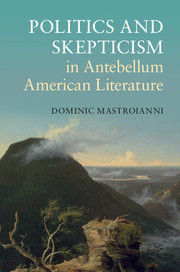Description
Politics and Skepticism in Antebellum American Literature
Cambridge Studies in American Literature and Culture Series
Author: Mastroianni Dominic
This volume explores the way in which antebellum American writers perceived the political implications of modern philosophical skepticism.
Language: EnglishApproximative price 91.54 €
In Print (Delivery period: 14 days).
Add to cart
Politics and Skepticism in Antebellum American Literature
Publication date: 10-2014
232 p. · 15.8x23.5 cm · Hardback
Publication date: 10-2014
232 p. · 15.8x23.5 cm · Hardback
Approximative price 28.98 €
In Print (Delivery period: 14 days).
Add to cart
Politics and Skepticism in Antebellum American Literature
Publication date: 09-2016
Support: Print on demand
Publication date: 09-2016
Support: Print on demand
Description
/li>Contents
/li>Biography
/li>
In confronting their tumultuous time, antebellum American writers often invoked unrevealable secrets. Five of Ralph Waldo Emerson's most inventive interlocutors - Melville, Hawthorne, Dickinson, Douglass and Jacobs - produced their most riveting political thought in response to Emerson's idea that moods fundamentally shape one's experience of the world, changing only through secret causes that no one fully grasps. In this volume, Dominic Mastroianni frames antebellum and Civil War literature within the history of modern philosophical skepticism, ranging from Descartes and Hume to Levinas and Cavell, arguing that its political significance lies only partially in its most overt engagement with political issues like slavery, revolution, reform, and war. It is when antebellum writing is most philosophical, figurative, and seemingly unworldly that its political engagement is most profound. Mastroianni offers new readings of six major American authors and explores the teeming archive of nineteenth-century print culture.
1. Moods and the secret cause of revolution in Emerson; 2. Revolutionary time and democracy's cause in Melville's Pierre; 3. Hawthorne and the temperatures of secrecy; 4. Causes of falling, civil war, and the poetics of survival in Dickinson's 'Fascicle 24'.
Dominic Mastroianni is an Assistant Professor of English at Clemson University, South Carolina. He is the winner of the 2012 Hennig Cohen Prize, awarded by The Melville Society for the best essay or chapter in Melville studies. He is currently writing a monograph on vulnerability, philosophy, and nineteenth-century American literature.
© 2024 LAVOISIER S.A.S.





